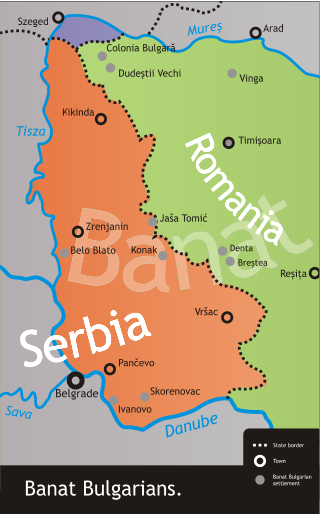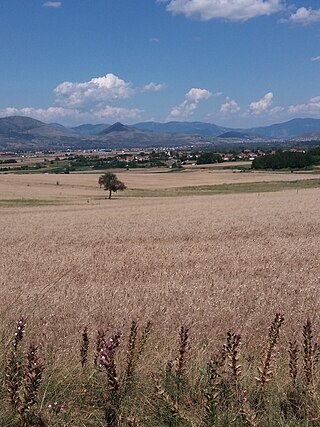
Duke of Atholl, named after Atholl in Scotland, is a title in the Peerage of Scotland held by the head of Clan Murray. It was created by Queen Anne in 1703 for John Murray, 2nd Marquess of Atholl, with a special remainder to the heir male of his father, the 1st Marquess.

Atholl or Athole is a district in the heart of the Scottish Highlands, bordering Marr, Gowrie, Perth, Strathearn, Breadalbane, Lochaber, and Badenoch. Historically it was a Pictish kingdom, becoming one of the original provinces of the Kingdom of Alba before being incorporated into the sheriffdom and later county of Perthshire. Today it forms the northern part of Perth and Kinross, Scotland.

The Ilinden–Preobrazhenie Uprising, or simply the Ilinden Uprising, of August–October 1903, was an organized revolt against the Ottoman Empire, which was prepared and carried out by the Internal Macedonian-Adrianople Revolutionary Organization, with the support of the Supreme Macedonian-Adrianople Committee, which included mostly Bulgarian military personnel. The name of the uprising refers to Ilinden, a name for Elijah's day, and to Preobrazhenie which means Feast of the Transfiguration. Some historians describe the rebellion in the Serres revolutionary district as a separate uprising, calling it the Krastovden Uprising, because on September 14 the revolutionaries there also rebelled. The revolt lasted from the beginning of August to the end of October and covered a vast territory from the western Black Sea coast in the east to the shores of Lake Ohrid in the west.

Blair Atholl is a village in Perthshire, Scotland, built about the confluence of the Rivers Tilt and Garry in one of the few areas of flat land in the midst of the Grampian Mountains. The Gaelic place-name Blair, from blàr, 'field, plain', refers to this location. Atholl, which means 'new Ireland', from the archaic Ath Fhodla is the name of the surrounding district.

Georgi Nikolov Delchev, known as Gotse Delchev or Goce Delčev, was an important Macedonian Bulgarian revolutionary (komitadji), active in the Ottoman-ruled Macedonia and Adrianople regions, as well as in Bulgaria, at the turn of the 20th century. He was the most prominent leader of what is known today as the Internal Macedonian Revolutionary Organization (IMRO), a secret revolutionary society that was active in Ottoman territories in the Balkans at the end of the 19th and the beginning of the 20th century. Delchev was its representative in Sofia, the capital of the Principality of Bulgaria. As such, he was also a member of the Supreme Macedonian-Adrianople Committee (SMAC), participating in the work of its governing body. He was killed in a skirmish with an Ottoman unit on the eve of the Ilinden-Preobrazhenie uprising.

Blair Castle stands in its grounds near the village of Blair Atholl in Perthshire in Scotland. It is the ancestral home of the Clan Murray, and was historically the seat of their chief, the Duke of Atholl, though the current chief, the 12th Duke of Atholl, lives in South Africa, where he was born and raised. The castle stands in Glen Garry, and commands a strategic position on the main route through the central Scottish Highlands.

Bulgarian Turks are ethnic Turks from Bulgaria. According to the 2021 census, there were 508,375 Bulgarians of Turkish descent, roughly 8.4% of the population, making them the country's largest ethnic minority. Bulgarian Turks also comprise the largest single population of Turks in the Balkans. They primarily live in the southern province of Kardzhali and the northeastern provinces of Shumen, Silistra, Razgrad and Targovishte. There is also a diaspora outside Bulgaria in countries such as Turkey, Austria, the Netherlands, Sweden, Norway and Romania, the most significant of which are the Bulgarian Turks in Turkey.

The Banat Bulgarians, also known as Bulgarian Roman Catholics and Bulgarians Paulicians or simply as Paulicians, are a distinct Bulgarian minority group which since the Chiprovtsi Uprising in the late 17th century began to settle in the region of the Banat, which was then ruled by the Habsburgs and after World War I was divided between Romania, Serbia, and Hungary. Unlike most other Bulgarians, they are Roman Catholic by confession and stem from groups of Paulicians and Roman Catholics from modern northern and northwestern Bulgaria.

Russians form the fourth largest ethnic group in Bulgaria, numbering 31,679 in 2019, and mostly living in the large urban centres, such as Sofia, Plovdiv, Varna and Burgas. Although the largest wave of Russian settlers arrived following the events surrounding the October Revolution and the Russian Civil War, compact groups of Russians had been living in Bulgaria for centuries before that.

Mandritsa is a village in southernmost Bulgaria, part of Ivaylovgrad municipality, Haskovo Province. It is known as the only Albanian village in Bulgaria. As of 14 December 2006, Mandritsa has a population of 75. It lies at 41°23′N26°8′E, 93 m above sea level.

Kalochori, is a small rural village, part of the municipal unit of Kastoria, Kastoria regional unit, Greece. Kalochori is also located 14 kilometers away from the city of Kastoria and 14 kilometers away from the village of Nestorio. It was a part of the former municipal unit of Mesopotamia. The village has an elevation of 721 meters above sea level.

Aydemir is a village in northeastern Bulgaria, part of Silistra Municipality, Silistra Province. Aydemir had 5711 inhabitants in 2016, down from 9095 short after the fall of communism in 1992. It is the second most populous village in Bulgaria: the village of Lozen took the lead as its population grew to 6252 people while Aydemir lost many inhabitants in the same period. Aydemir lies at 44°6′N27°10′E, 31 m above sea level. The village is located in the valley of the Danube, 3 km south of the river and 8 km west of Silistra, on the road from Silistra to Rousse. The mayor is Rumen Angelov.
Kochan is a village in Southwestern Bulgaria. It is located in Satovcha Municipality, Blagoevgrad Province.
Slavic speakers are a minority population in the northern Greek region of Macedonia, who are mostly concentrated in certain parts of the peripheries of West and Central Macedonia, adjacent to the territory of the state of North Macedonia. Their dialects are called today "Slavic" in Greece, while generally they are considered Macedonian. Some members have formed their own emigrant communities in neighbouring countries, as well as further abroad.

The foreign relations of Bulgaria are overseen by the Ministry of Foreign Relations headed by the Minister of Foreign Affairs. Situated in Southeast Europe, Bulgaria is a member of both NATO and the European Union. It maintains diplomatic relations with 183 countries.
Rezovo is a village and seaside resort in southeastern Bulgaria, part of Tsarevo Municipality, Burgas Province, in the coastal Strandzha geographical region.

Kalindria is a village in the Kilkis region of Greece. It is situated in the municipal unit of Cherso, in the Kilkis municipality, within the Kilkis region of Central Macedonia.

Akritas is a village situated in the municipal unit of Doirani of the municipality of Kilkis, in the Kilkis regional unit of Central Macedonia, Greece.

Sliven Valley is situated in eastern central Bulgaria. It is named after the city of Sliven, its main settlement. It is the ninth of the eleven Sub-Balkan valleys in direction west–east and is the second largest of them, after the Sofia Valley.
















